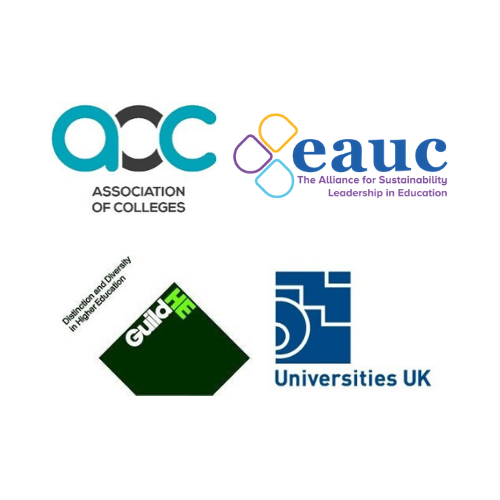Climate Commission: the FHE sector must have a comprehensive reporting process for GHG emissions
This blog post was written by Sonya Peres on behalf of the Climate Commission secretariat.
The increasingly pressing climate crisis affects biodiversity, global health and housing security; it offers a whole menu of other consequences that we unfortunately can't pick and choose. Amid this crisis is climate change, the warming of the earth’s average temperatures, and the changing of weather patterns, caused by human activities emitting large volumes of greenhouse gases.
Cross-sectoral efforts are underway to curb greenhouse gas emissions: many universities and colleges are decarbonising their fleets by moving to electric cars, campaigning to discourage air travel and switching to renewable energy, but our measuring and reporting of these emissions need to be better understood and improved.
Why? Because climate action is incomplete without accurately measuring and reporting greenhouse gas emissions from our activities.
It is important to monitor, report and measure the greenhouse gases universities and colleges emit directly and indirectly. Not simply to know the level of greenhouse gases our operations and activities emit into the atmosphere so we can curb these emissions, but to understand and communicate our progress, our successes and our challenges within and outside of the sector and to gauge where we are as a sector in terms of climate action. Effectively and comprehensively monitoring, reporting and measuring greenhouse gases also supports us to share and learn from best practice, encouraging collaboration amongst the strong set of expertise within our sector.
The Climate Commission for UK Higher and Further Education recognises the importance of measuring and reporting greenhouse gas emissions. At its early stages, the Commission developed a target statement, acknowledging government-mandated targets to bring all emissions down to net-zero by 2050, and pushing the sector even further to commit to reducing scope 1 and 2 (direct emissions) to net-zero by 2030. Following the publication of these targets, the Commission held an evidence gathering event where experts shared their thoughts on the current level of measuring and reporting greenhouse gas emissions in the further and higher education sector, and offered guidance on how to ensure this reporting contributes to comprehensive climate action and achieving net-zero targets. The event also facilitated discussion on and engagement in understanding Scope 3 emissions – indirect emissions from an organisation’s value chain (ie. commuting, procurement, business travel). Capturing Scope 3 emissions can be tricky, but crucial, nonetheless.
After synthesising themes from the evidence gathering event, alongside institutional and student Commissioners’, Jim Longhurst (Assistant Vice-Chancellor, University of the West of England) and Manveer Gill (Recent graduate, University of Warwick) thoughts on the matter, it is clear that continued incomplete and/or inaccurate reporting can damage the credibility, reputation and trust that further and higher education institutions have with the wider public and their students.
Expert witnesses and Climate Commissioners believe accurate and comprehensive reporting of greenhouse gas emissions is important to maintain and further develop the trust placed on universities and colleges to be leaders in their local and global communities and amongst students, the heart and soul of their institutions.
In England and Wales, reporting scope 1 and 2 greenhouse gases emitted by universities and colleges is voluntary and reporting scope 3 is discretionary. Since 2014, Scottish universities and colleges report their scope 1, 2 and 3 emissions through the government mandated Public Bodies Climate Change Duties Reporting. However, reporting boundaries can be blurred, with institutions missing some key sources of emissions, particularly in the scope 3 category. For example, commuting and business travel (including transport and hotel stays) are significant sources of emissions for the sector. In 2019, 86% Scottish institutions reported business travel emissions, accounting for 18% of total Scottish sector emissions. However, reporting these specific emissions is not mandatory anywhere in the UK, contributing to an incomplete understanding of the sector’s greenhouse gas emissions and its scope for mitigation. Collecting data from scope 3 emissions is understandably difficult as institutions may feel they do not have control over these emissions, but it is a critical component of the combined sector’s contribution to the climate crisis and essential knowledge if effective and efficient mitigation measures are to be formulated.
At the evidence gathering event, expert witnesses emphasised the significant proportion of total emissions for which scope 3 accounts, with one expert estimating it could account for 60% of total emissions, and urging those who are slightly more informed in carbon accounting to be “honest and blunt about the fact that reporting scope 1 and 2 alone is misleading and meaningless.”
Both Commissioners believe accurate and comprehensive reporting would support stakeholders outside of the sector, with Jim saying, “setting out the actions we are taking can encourage our stakeholders to act and the experience we have in dealing with the problems and challenges can make the job of others much easier in addressing emissions reporting.”
Manveer, like Jim, believes more comprehensive reporting is transparent and can “strengthen trust between institutions and their students.” He believes accurate reporting can contribute to league tables for environmental performance, allowing students to hold their institutions accountable, telling me, “with students caring more and more, I think league tables and marketing campaigns would pick up on this.”
Expert witnesses mirror this point, expressing that there may be a “reputational risk” to inadequate climate action with partial and incomplete carbon reporting.
Universities and colleges need to be supported by central and devolved governments to achieve more comprehensive and accurate reporting. Central to this will be an agreed understanding of operational boundaries, data collection and analysis. .. We need to see comprehensive reporting as an essential part of the annual reporting cycle and not discretionary. The Climate Commission is working to support comprehensive reporting for efficient and effective climate action.
Please visit our website for more information.











